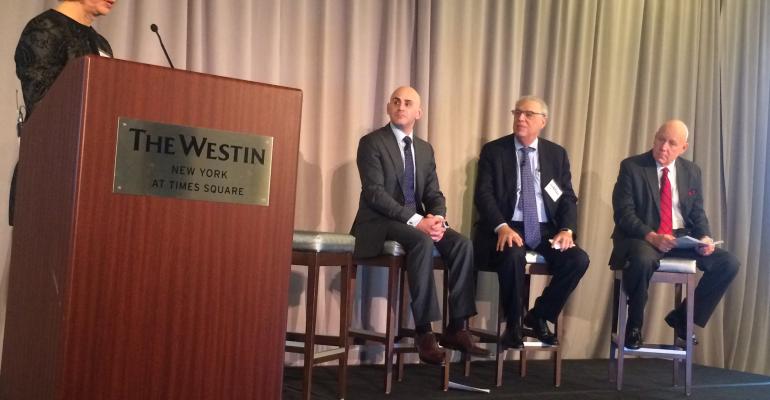A third of plan sponsors not working with an advisor say they’re likely to do so in the future, and six in 10 plan sponsors with assets between $25 to $75 million expect to hire an advisor, according to a new study by MassMutual. This represents a significant opportunity for advisors, yet retirement plan advisors are doing a bad job articulating why a plan should do business with them.
Mathew Greenwald, president of Greenwald & Associates, which conducted the research, interviewed about 20 advisors as part of the study and was disappointed with their elevator speeches.
“I asked each of them, ‘What is your value proposition? Why should companies do business with you?’ I was going to say I was disappointed in the answers, but the better word is ‘shocked’ at how poor most of them did,” Greenwald said during an advisor symposium in New York on Tuesday.
“Very few of them made a very convincing case, or took the time to really craft something. I came away with the feeling that many of them really didn’t think they were better, and that comes across.”
The study included an online survey of 565 plan sponsors, 449 of which work with an advisor, as well as the 20-advisor focus group.
Tom Foster, national spokesman for MassMutual Retirement Services, said advisors should be able to articulate more than just what they do and how they do it.
“The most critical component for people who are successful, not only in business but in life, is why,” Foster said. “Why do you do what you do? What drives you? Because people don’t care what you do; they care why you do it.”
Advisors should also be able to communicate their background—why they’re qualified to give the information they’re giving, the resources they bring to bear, and any accolades that set them apart, Foster said.
MassMutual’s study aims to identify what aspects of an advisor relationship are most valued by plan sponsors. Overall, plan sponsors say employee education, good customer service and reducing plan costs are most important.
But there were a few disconnects between advisors and plan sponsors in the study. For one, the majority (65 percent) of plan sponsors with assets between $25 to $75 million would like an advisor to provide education or advice to employees in person semiannually or more often, compared to 49 percent of plans with $5 to $25 million, 51 percent of plans with $1 to $5 million and 40 percent of plans below $1 million.
But advisors say it’s difficult to get sponsors to schedule a time to come in and get employees to attend.
“Sponsors who work with an advisor prefer more frequent education than they’re currently receiving,” said Elaine Sarsynski, executive vice president, MassMutual Retirement Services and Worksite Insurance. “If they want it more frequently, we’ll have to find a way creatively, if you can’t do it person, to do it through the web, do it through digital, do it through mobile.”
Jeff Snyder, vice president at Cammack Retirement Services, said his firm focused on data mining to overcome this challenge. They looked at different constituency groups at the companies they work with to figure out how best to get the message to these groups.
MassMutual also found a disconnect on fiduciary responsibilities. While 34 percent of plan sponsors say their advisor is the fiduciary to the plan, a majority of advisors say they do not act as the fiduciary.
“According to advisors, plan sponsors are, the word here is ‘clueless,’ but I would just say need more help in terms of understanding their fiduciary responsibilities on the plan,” Sarsynski said. “Even if they choose, let’s say, an RIA to manage the investments, they still have responsibility over oversight of that contractual obligation that they just entered into with that investment advisor.”
Communication about costs is another challenge for plan advisors. Seventy-three percent of plans want help lowering costs. Sponsors who do not work with an advisor are primarily interested in working with an advisor to lower costs.
“Advisors say that providing good service and building a relationship with plan sponsors is really more important in terms of retaining that book of business,” Sarsynski said.
Greenwald said advisors can help plan sponsors understand different ways of reducing costs, such as getting more people to participate to get the asset level up, looking at different investment options, and conducting plan reviews to make sure pricing is competitive.





